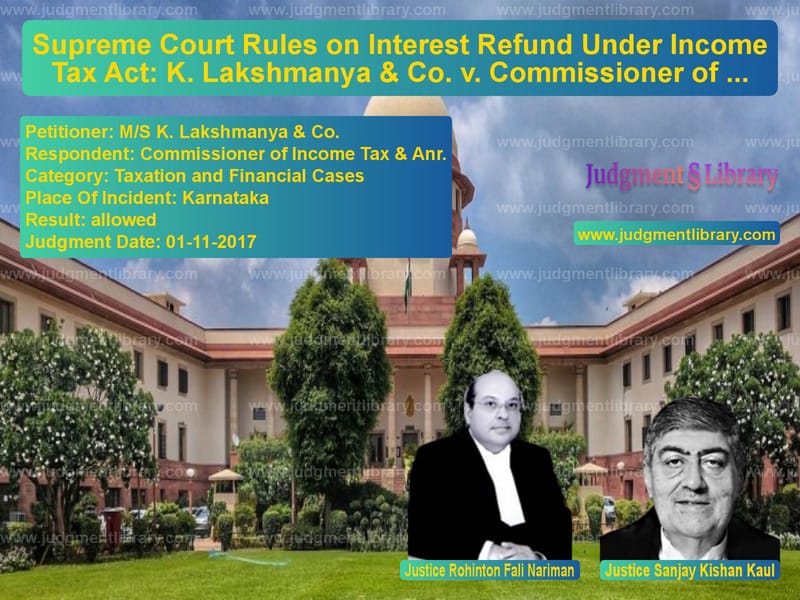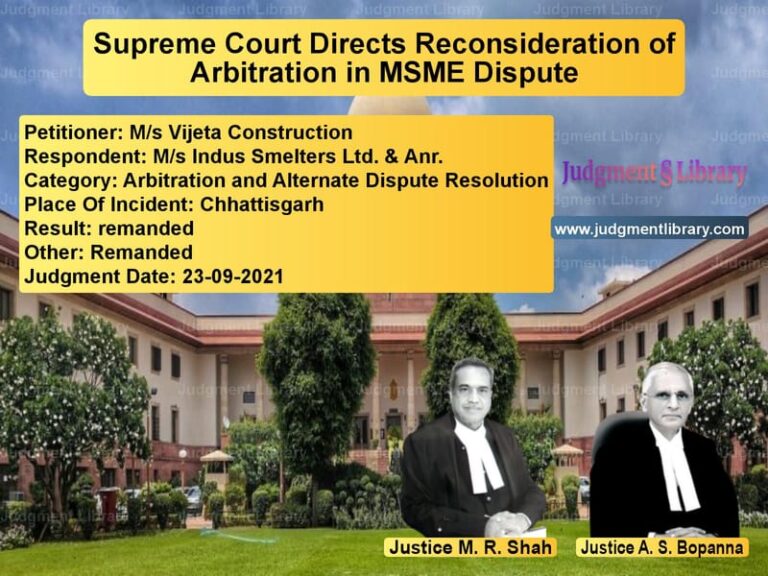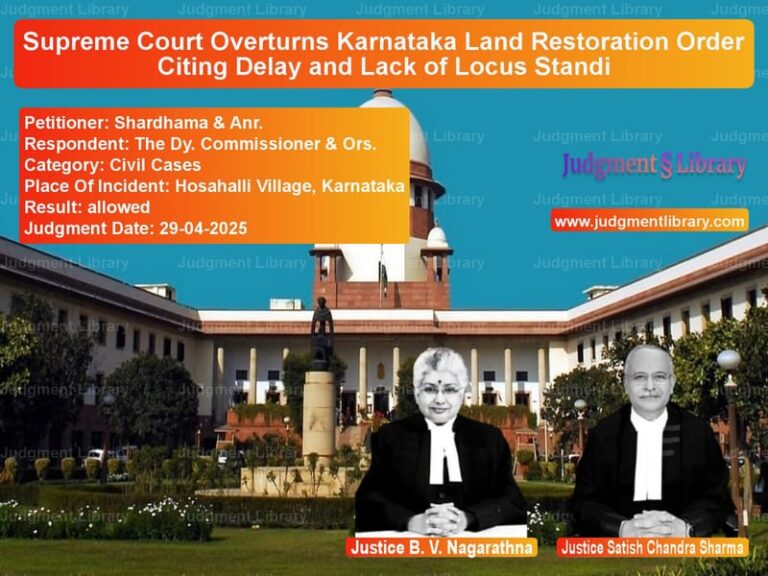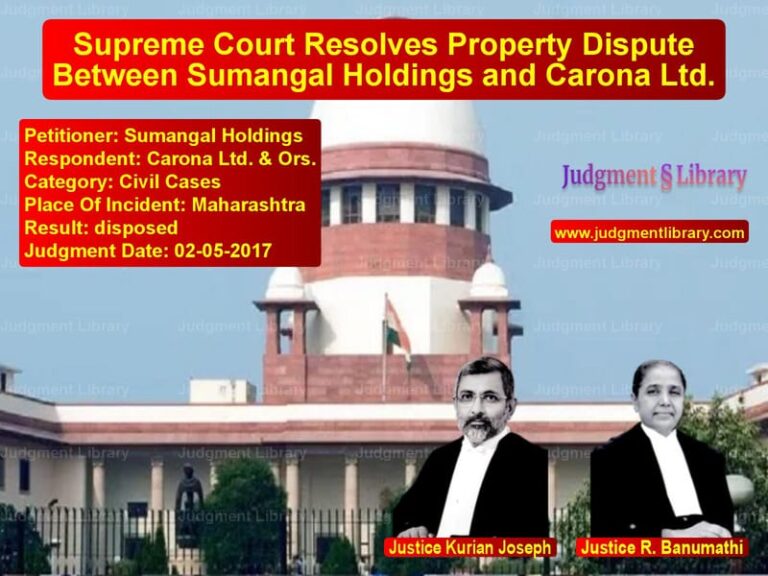Supreme Court Rules on Interest Refund Under Income Tax Act: K. Lakshmanya & Co. v. Commissioner of Income Tax
The Supreme Court of India recently ruled in the case of M/S K. Lakshmanya & Co. v. Commissioner of Income Tax & Anr., addressing whether an assessee is entitled to interest under Section 244A of the Income Tax Act, 1961, when a refund arises due to the waiver of interest by the Settlement Commission. The judgment has significant implications for taxpayers seeking refunds based on discretionary waivers.
Background of the Case
The case involved the assessment years 1993-94 and 1994-95. The petitioner, a partnership firm, filed income tax returns for these years. After the completion of assessment, the tax authorities levied interest under Sections 234(A), 234(B), and 234(C) of the Income Tax Act, 1961.
Aggrieved by this levy, the petitioner approached the Settlement Commission seeking a waiver of interest. The Settlement Commission, through an order dated March 22, 2000, partially waived the interest, citing a Central Board of Direct Taxes (CBDT) circular that granted discretionary powers for such waivers. The assessee then sought a refund of the excess interest paid along with interest on the refund amount.
The Assessing Officer rejected the request for interest on the refunded amount, arguing that:
- Section 244A does not provide for interest on refunds arising from the waiver of interest levied under Sections 234(A)–(C).
- The Settlement Commission’s waiver of interest does not automatically entitle the assessee to interest under Section 244A.
The assessee appealed this decision to the Commissioner of Income Tax (Appeals) [CIT(A)], which ruled in favor of the assessee. The Income Tax Appellate Tribunal (ITAT) upheld this decision. However, the Karnataka High Court overturned these rulings and restored the Assessing Officer’s decision, prompting the assessee to appeal to the Supreme Court.
Key Legal Issues Before the Supreme Court
The Supreme Court examined the following legal questions:
- Whether Section 244A of the Income Tax Act mandates payment of interest on refunds due to the waiver of interest under Sections 234(A)–(C).
- Whether the Settlement Commission’s discretionary waiver creates a right to claim a refund along with interest under Section 244A.
- Whether the Karnataka High Court erred in denying interest on the refunded amount.
Arguments by the Petitioner (K. Lakshmanya & Co.)
The petitioner argued that:
- The waiver of interest resulted in a refund of excess amounts paid, which falls within the ambit of Section 244A.
- The phrase “any amount becomes due” in Section 244A covers refunds arising from both tax overpayments and interest waivers.
- The CBDT’s circular empowered the Settlement Commission to grant waivers, making the waiver legally binding.
- Similar cases had been decided in favor of taxpayers, including the case of Commissioner of Income Tax v. Needle Industries Pvt. Ltd. (1998) and Sandvik Asia Ltd. v. Commissioner of Income Tax (2006), where the Supreme Court recognized that refunds include interest.
Arguments by the Respondent (Commissioner of Income Tax)
The tax department countered that:
- Interest under Section 244A applies only to refunds arising due to tax overpayments, not to interest waivers.
- The term “refund” in Section 244A refers strictly to tax payments, not interest amounts waived by the Settlement Commission.
- The Settlement Commission’s order does not automatically grant the assessee a right to claim interest on the refunded amount.
- The High Court correctly interpreted the statutory framework by distinguishing between tax overpayments and interest waivers.
Supreme Court’s Observations
The Supreme Court carefully analyzed the statutory provisions and past judicial rulings. It noted:
- Section 244A explicitly states that interest is payable on refunds “under this Act.”
- The expression “refund of any amount” in Section 244A is broad and includes amounts refunded due to excess payments.
- The legislative intent behind Section 244A is to compensate taxpayers for delays in receiving refunds, irrespective of whether the refund arises from tax overpayments or interest waivers.
- The CBDT circular empowering the Settlement Commission to waive interest was legally valid and binding on tax authorities.
The Court also examined previous judgments, including:
- Sandvik Asia Ltd. v. Commissioner of Income Tax (2006), where it was held that taxpayers must be compensated for delays in refund payments.
- Commissioner of Income Tax v. H.E.G. Ltd. (2010), which ruled that interest on refunds includes interest on excess interest payments.
- Union of India v. Tata Chemicals Ltd. (2014), where the Court emphasized that interest refunds are a statutory right, not a discretionary benefit.
The Supreme Court concluded:
“The statutory obligation to refund carries with it the right to interest. The power of the Settlement Commission to waive interest creates a corresponding right for the assessee to claim a refund with interest under Section 244A.”
Final Judgment
The Supreme Court ruled in favor of the petitioner, holding:
- The assessee is entitled to interest under Section 244A on the refunded amount arising from the waiver of interest under Sections 234(A)–(C).
- The Karnataka High Court erred in denying interest on the refunded amount.
- The tax department must pay interest from the date the refund became due until the date it is actually paid.
- The appeal is allowed, and the judgment of the High Court is set aside.
Significance of the Judgment
This ruling has major implications for taxpayers seeking refunds due to waivers of interest:
- It clarifies that refunds under Section 244A include amounts refunded due to discretionary waivers.
- It ensures that taxpayers are compensated for delays in receiving refunds, reinforcing fair treatment.
- It affirms the binding nature of CBDT circulars, ensuring that tax authorities comply with administrative directives.
- It strengthens taxpayer rights in settlement proceedings.
Conclusion
The Supreme Court’s ruling reinforces the principle that taxpayers are entitled to fair compensation when refunds are delayed, even if they arise from interest waivers. This judgment ensures that tax authorities cannot deny legitimate claims for interest refunds and upholds the integrity of the tax refund process.
Don’t miss out on the full details! Download the complete judgment in PDF format below and gain valuable insights instantly!
Download Judgment: MS K. Lakshmanya & vs Commissioner of Inco Supreme Court of India Judgment Dated 01-11-2017.pdf
Direct Downlaod Judgment: Direct downlaod this Judgment
See all petitions in Income Tax Disputes
See all petitions in Tax Refund Disputes
See all petitions in Banking Regulations
See all petitions in Judgment by Rohinton Fali Nariman
See all petitions in Judgment by Sanjay Kishan Kaul
See all petitions in allowed
See all petitions in supreme court of India judgments November 2017
See all petitions in 2017 judgments
See all posts in Taxation and Financial Cases Category
See all allowed petitions in Taxation and Financial Cases Category
See all Dismissed petitions in Taxation and Financial Cases Category
See all partially allowed petitions in Taxation and Financial Cases Category







